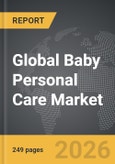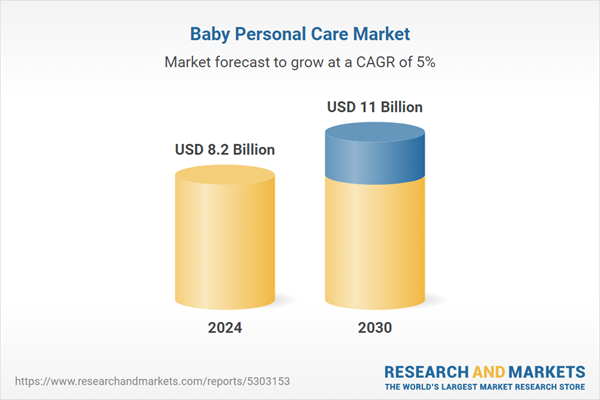Global Baby Personal Care Market - Key Trends and Drivers Summarized
Why Is Baby Personal Care So Important for Early Development?
Baby personal care is fundamental to supporting the unique hygiene and skin health needs of infants and young children. A baby's skin, much thinner and more sensitive than adult skin, is highly susceptible to dryness, irritation, and infections, making gentle and effective personal care products essential during early development. The first few years of life are a critical period for skin health, as a baby's natural skin barrier is still developing and requires products that nourish, hydrate, and protect without causing irritation. Regular use of gentle cleansers, moisturizers, and wipes helps to maintain hygiene, prevent skin problems, and support a healthy skin barrier. Unlike adult products, baby personal care items are formulated to avoid harsh chemicals, artificial fragrances, and dyes, opting instead for mild, hypoallergenic ingredients that suit the sensitive nature of baby skin. This careful approach to formulation has made baby personal care products an integral part of early parenting, helping to ensure not only the child's physical comfort but also emotional bonding. These moments of care help foster a nurturing environment, as routines like bath time or applying lotion offer soothing, shared experiences that reinforce emotional closeness and a sense of security for the child. As parents recognize the importance of quality products, they are becoming more selective in their choices, knowing that these early decisions can lay a foundation for lifelong skin health and comfort.How Are Baby Care Products Designed to Prioritize Safety and Gentle Care?
Safety is the cornerstone of baby personal care product design, with manufacturers going to great lengths to ensure products meet rigorous standards for efficacy, gentleness, and purity. Unlike adult skincare, baby products are often dermatologically tested multiple times to guarantee they're safe for sensitive skin, with formulas tailored to minimize any risk of irritation or allergic reactions. Key ingredients like aloe vera, chamomile, and calendula are commonly used for their natural soothing and hydrating properties, helping to alleviate dryness, prevent rashes, and maintain skin moisture balance without compromising a baby's delicate skin barrier. Many modern products are pH-balanced to match the slightly acidic nature of baby skin, a design choice that helps protect against irritation and maintain natural skin defenses. Features such as tear-free formulas, especially in shampoos and cleansers, provide added comfort and safety during bath time, ensuring that accidental splashes don't cause discomfort. Recognizing growing demand, many brands now offer natural and organic baby care products, avoiding synthetic chemicals, artificial colors, and preservatives in favor of plant-based, hypoallergenic formulations that are both gentle and effective. These organic options appeal to parents looking for “clean” skincare that is both eco-friendly and safe, catering to a broad range of family preferences. This meticulous approach to product development underscores the commitment within the industry to deliver personal care solutions that cater to babies' specific needs, ensuring that parents can confidently use these products as part of a daily care routine.What Role Does Sustainability Play in Modern Baby Personal Care?
As awareness of environmental impact increases, sustainability has become a priority in the baby personal care sector, with brands making conscious efforts to reduce waste, lower emissions, and adopt eco-friendly practices. Traditional baby personal care items often rely on plastic-based packaging and synthetic chemicals, which contribute significantly to environmental pollution. Recognizing this, companies are increasingly focusing on using biodegradable, recyclable, and even compostable materials in both products and packaging. Baby wipes, for example, are now widely available in biodegradable options, made from plant-based fibers and designed to break down more easily than conventional options. Many brands are also reducing their reliance on single-use plastics by opting for more sustainable materials like glass, recycled plastics, or refillable containers. Additionally, certain companies are exploring the use of waterless formulations, which reduce the need for water in production and minimize packaging weight, helping to reduce overall resource consumption and carbon emissions. The rise of sustainable sourcing has also influenced the industry, with brands selecting ingredients that are not only safe and gentle for babies but also responsibly harvested, supporting fair trade and biodiversity conservation initiatives. This shift towards sustainable baby care products provides parents with options that align with their eco-conscious values, allowing them to make choices that prioritize both their child's health and the health of the planet. By fostering a culture of sustainability, baby care brands are empowering a new generation of parents to embrace products that are as kind to the earth as they are to their children's sensitive skin.What Are the Factors Fueling Growth in the Baby Personal Care Market?
The growth in the baby personal care market is driven by several factors, each reflecting changing consumer preferences, advancements in product formulation, and increased awareness of infant skincare needs. As parents become more informed about the importance of using safe, non-toxic, and gentle products for their children, there is a marked shift toward products that are hypoallergenic, natural, and organic. This shift has created a booming demand for clean, eco-friendly, and premium personal care products that prioritize safe, high-quality ingredients. Parents are increasingly seeking products that go beyond basic functionality to address specific needs, such as moisture-locking lotions for babies prone to dryness, or nutrient-enriched oils to support skin elasticity and resilience. The rise of digital retail channels has also contributed significantly to market growth, making baby personal care products more accessible to a wider audience and offering convenience through home delivery and subscription services. Furthermore, advancements in skincare science and dermatology are allowing manufacturers to develop products that are more specialized and tailored to infant dermatology, offering enhanced safety and efficacy that align with pediatric health recommendations. The demand for convenience has also led to a rise in multi-functional products, such as gentle all-in-one wash and shampoo, catering to busy parents looking to simplify their baby's skincare routine. Altogether, these factors reflect a dynamic and rapidly growing baby personal care market, where product innovation, consumer awareness, and environmental responsibility come together to shape the future of infant care. This evolving landscape underscores the industry's commitment to addressing modern parents' needs while delivering safe, effective, and sustainable care options for the next generation.Report Scope
The report analyzes the Baby Personal Care market, presented in terms of market value (US$ Thousand). The analysis covers the key segments and geographic regions outlined below.- Segments: Product (Cosmetics, Toiletries, Other Products); Distribution Channel (Hypermarkets & Supermarkets, Specialty Stores, Online).
- Geographic Regions/Countries:World; United States; Canada; Japan; China; Europe (France; Germany; Italy; United Kingdom; Spain; Russia; and Rest of Europe); Asia-Pacific (Australia; India; South Korea; and Rest of Asia-Pacific); Latin America (Argentina; Brazil; Mexico; and Rest of Latin America); Middle East (Iran; Israel; Saudi Arabia; United Arab Emirates; and Rest of Middle East); and Africa.
Key Insights:
- Market Growth: Understand the significant growth trajectory of the Cosmetics segment, which is expected to reach US$4.7 Billion by 2030 with a CAGR of a 4.5%. The Toiletries segment is also set to grow at 5.1% CAGR over the analysis period.
- Regional Analysis: Gain insights into the U.S. market, valued at $2.2 Billion in 2024, and China, forecasted to grow at an impressive 7.4% CAGR to reach $2.4 Billion by 2030. Discover growth trends in other key regions, including Japan, Canada, Germany, and the Asia-Pacific.
Why You Should Buy This Report:
- Detailed Market Analysis: Access a thorough analysis of the Global Baby Personal Care Market, covering all major geographic regions and market segments.
- Competitive Insights: Get an overview of the competitive landscape, including the market presence of major players across different geographies.
- Future Trends and Drivers: Understand the key trends and drivers shaping the future of the Global Baby Personal Care Market.
- Actionable Insights: Benefit from actionable insights that can help you identify new revenue opportunities and make strategic business decisions.
Key Questions Answered:
- How is the Global Baby Personal Care Market expected to evolve by 2030?
- What are the main drivers and restraints affecting the market?
- Which market segments will grow the most over the forecast period?
- How will market shares for different regions and segments change by 2030?
- Who are the leading players in the market, and what are their prospects?
Report Features:
- Comprehensive Market Data: Independent analysis of annual sales and market forecasts in US$ Million from 2024 to 2030.
- In-Depth Regional Analysis: Detailed insights into key markets, including the U.S., China, Japan, Canada, Europe, Asia-Pacific, Latin America, Middle East, and Africa.
- Company Profiles: Coverage of players such as Abbott Nutrition, Avon Healthcare Limited Company, BABISIL, Bonpoint S.A., Burt’s Bees Inc. and more.
- Complimentary Updates: Receive free report updates for one year to keep you informed of the latest market developments.
Some of the 12 companies featured in this Baby Personal Care market report include:
- Abbott Nutrition
- Avon Healthcare Limited Company
- BABISIL
- Bonpoint S.A.
- Burt’s Bees Inc.
- Cotton Babies,Inc.
- Dabur International Limited
- Danone S.A.
- Farlin Infant Products Corporation
- Johnson & Johnson Limited company
This edition integrates the latest global trade and economic shifts into comprehensive market analysis. Key updates include:
- Tariff and Trade Impact: Insights into global tariff negotiations across 180+ countries, with analysis of supply chain turbulence, sourcing disruptions, and geographic realignment. Special focus on 2025 as a pivotal year for trade tensions, including updated perspectives on the Trump-era tariffs.
- Adjusted Forecasts and Analytics: Revised global and regional market forecasts through 2030, incorporating tariff effects, economic uncertainty, and structural changes in globalization. Includes historical analysis from 2015 to 2023.
- Strategic Market Dynamics: Evaluation of revised market prospects, regional outlooks, and key economic indicators such as population and urbanization trends.
- Innovation & Technology Trends: Latest developments in product and process innovation, emerging technologies, and key industry drivers shaping the competitive landscape.
- Competitive Intelligence: Updated global market share estimates for 2025, competitive positioning of major players (Strong/Active/Niche/Trivial), and refined focus on leading global brands and core players.
- Expert Insight & Commentary: Strategic analysis from economists, trade experts, and domain specialists to contextualize market shifts and identify emerging opportunities.
Table of Contents
Companies Mentioned (Partial List)
A selection of companies mentioned in this report includes, but is not limited to:
- Abbott Nutrition
- Avon Healthcare Limited Company
- BABISIL
- Bonpoint S.A.
- Burt’s Bees Inc.
- Cotton Babies,Inc.
- Dabur International Limited
- Danone S.A.
- Farlin Infant Products Corporation
- Johnson & Johnson Limited company
Table Information
| Report Attribute | Details |
|---|---|
| No. of Pages | 249 |
| Published | February 2026 |
| Forecast Period | 2024 - 2030 |
| Estimated Market Value ( USD | $ 8.2 Billion |
| Forecasted Market Value ( USD | $ 11 Billion |
| Compound Annual Growth Rate | 5.0% |
| Regions Covered | Global |









